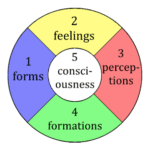7 Studies say it is
Investigating the Scientific Proof Behind Mindfulness Practices

Meditation is scientifically proven to improve many neurological, emotive, and physiological factors. See the neuroscience behind it, statistical data supporting its efficacy, and the physiological changes associated with this ancient practice.
Scientifically Proven Benefits of Meditation
Numerous scientific studies have delved into the benefits of meditation, demonstrating its positive impact on mental and physical well-being. For instance, a meta-analysis published in the Journal of the American Medical Association (JAMA) Psychiatry in 2014 concluded that mindfulness meditation can lead to significant reductions in symptoms of anxiety, depression, and pain (Goyal et al., 2014). This suggests that meditation has a tangible and positive effect on mental health.
Neuroscience of Meditation
Advancements in neuroscience have allowed researchers to explore the impact of meditation on the brain. Neuroimaging studies, such as the one conducted by Tang et al. and published in the Proceedings of the National Academy of Sciences, have shown that meditation can induce structural changes in the brain, particularly in regions associated with self-awareness, compassion, and introspection (Tang et al., 2015). These findings provide scientific evidence that meditation can lead to measurable and beneficial changes in the brain.
Statistics on Meditation Benefits
Beyond individual studies, statistical data further supports the efficacy of meditation. The National Center for Complementary and Integrative Health (NCCIH) reports that millions of adults in the United States have practiced meditation in the past 12 months, highlighting its widespread adoption (NCCIH, 2020).
Additionally, surveys conducted by organizations like the Pew Research Center reveal a growing interest in meditation as a complementary approach to conventional medicine (Pew Research Center, 2017). These statistics underscore the increasing recognition of meditation as a beneficial practice.
Scientific Facts about Meditation
To dispel any skepticism, here are some scientifically established facts about meditation. Firstly, meditation is not limited to a specific religious or spiritual context; it encompasses various secular forms, such as mindfulness meditation, which has been widely studied for its therapeutic effects (Chiesa & Malinowski, 2011). Moreover, meditation is not a one-size-fits-all practice, and individuals can choose from a variety of techniques based on their preferences and goals.
Meditation Research Articles
These key research articles contribute to the scientific discourse on meditation:
- “The underlying anatomical correlates of long-term meditation: Larger hippocampal and frontal volumes of gray matter” by Luders et al. (2009) – This study explores the structural changes in the brain associated with long-term meditation practice.
- “Mindfulness practice leads to increases in regional brain gray matter density” by Hölzel et al. (2011) – Published in Psychiatry Research: Neuroimaging, this article investigates the impact of mindfulness practice on changes in gray matter density.
- “Alterations in brain and immune function produced by mindfulness meditation” by Davidson et al. (2003) – Published in Psychosomatic Medicine, this study explores the connection between mindfulness meditation and improvements in brain and immune function.
Physiology of Meditation
Understanding the physiological changes induced by meditation is crucial for validating its scientific basis. Research published in the Journal of Alternative and Complementary Medicine (Muehsam et al., 2017) discusses the physiological mechanisms through which meditation can influence various bodily functions, including heart rate, blood pressure, and stress hormone levels. These findings provide concrete evidence of the physiological impact of meditation.
Conclusion
In conclusion, the scientific evidence supporting the benefits of meditation is robust and diverse. From positive effects on mental health to structural changes in the brain, meditation has garnered significant attention in the scientific community. The increasing adoption of meditation, backed by statistical data, further emphasizes its relevance in contemporary society. As research continues to explore the nuances of meditation, it is evident that this ancient practice holds promising potential for enhancing overall well-being.



References:
Goyal, M., Singh, S., Sibinga, E. M., Gould, N. F., Rowland-Seymour, A., Sharma, R., … & Ranasinghe, P. D. (2014). Meditation programs for psychological stress and well-being: a systematic review and meta-analysis. JAMA Psychiatry, 71(6), 568-578.
Tang, Y. Y., Hölzel, B. K., & Posner, M. I. (2015). The neuroscience of mindfulness meditation. Nature Reviews Neuroscience, 16(4), 213-225.
National Center for Complementary and Integrative Health (NCCIH). (2020). Meditation: In depth. Retrieved from https://www.nccih.nih.gov/health/meditation-in-depth
Pew Research Center. (2017). In U.S., familiarity with mindfulness meditation is widespread. Retrieved from https://www.pewresearch.org/fact-tank/2017/08/08/in-u-s-familiarity-with-mindfulness-meditation-is-widespread/
Chiesa, A., & Malinowski, P. (2011). Mindfulness-based approaches: are they all the same? Journal of Clinical Psychology, 67(4), 404-424.
Luders, E., Toga, A. W., Lepore, N., & Gaser, C. (2009). The underlying anatomical correlates of long-term meditation: Larger hippocampal and frontal volumes of gray matter. NeuroImage, 45(3), 672-678.
Hölzel, B. K., Carmody, J., Vangel, M., Congleton, C., Yerramsetti, S. M., Gard, T., & Lazar, S. W. (2011). Mindfulness practice leads to increases in regional brain gray matter density. Psychiatry Research: Neuroimaging, 191(1), 36-43.
Davidson, R. J., Kabat-Zinn, J., Schumacher, J., Rosenkranz, M., Muller, D., Santorelli, S. F., … & Sheridan, J. F. (2003). Alterations in brain and immune function produced by mindfulness meditation. Psychosomatic Medicine, 65(4), 564-570.
Muehsam, D., Lutgendorf, S., Mills, P. J., Rickhi, B., Chevalier, G., Bat, N., … & Feinstein, D. (2017). The embodied mind: A review on functional genomic and neurological correlates of mind-body therapies. The Journal of Alternative and Complementary Medicine, 23(10), 730-741.

May all beings be happy
May all beings be peaceful
May all beings be safe
May all beings awaken to the light of their true nature
May all beings be free







